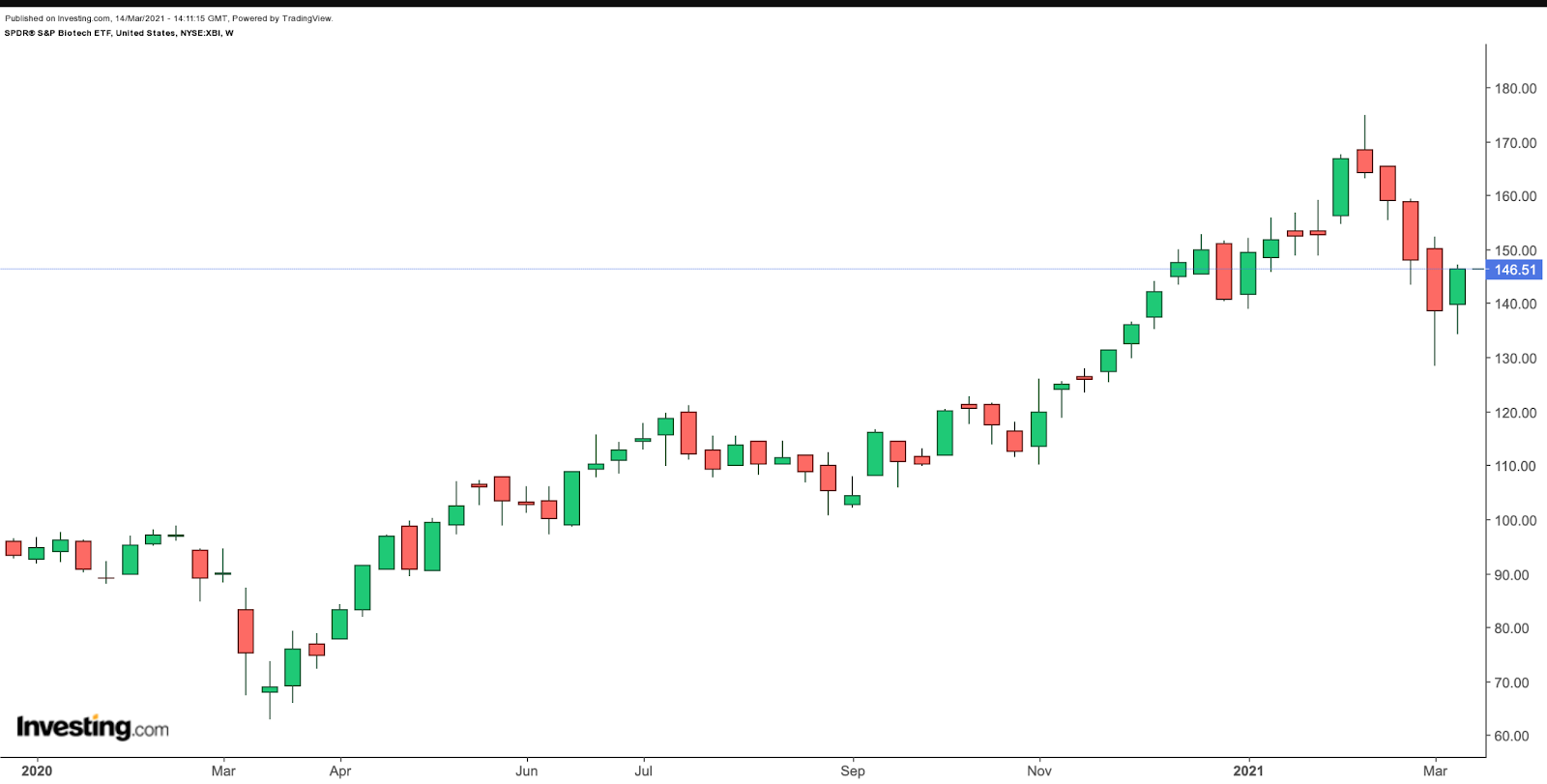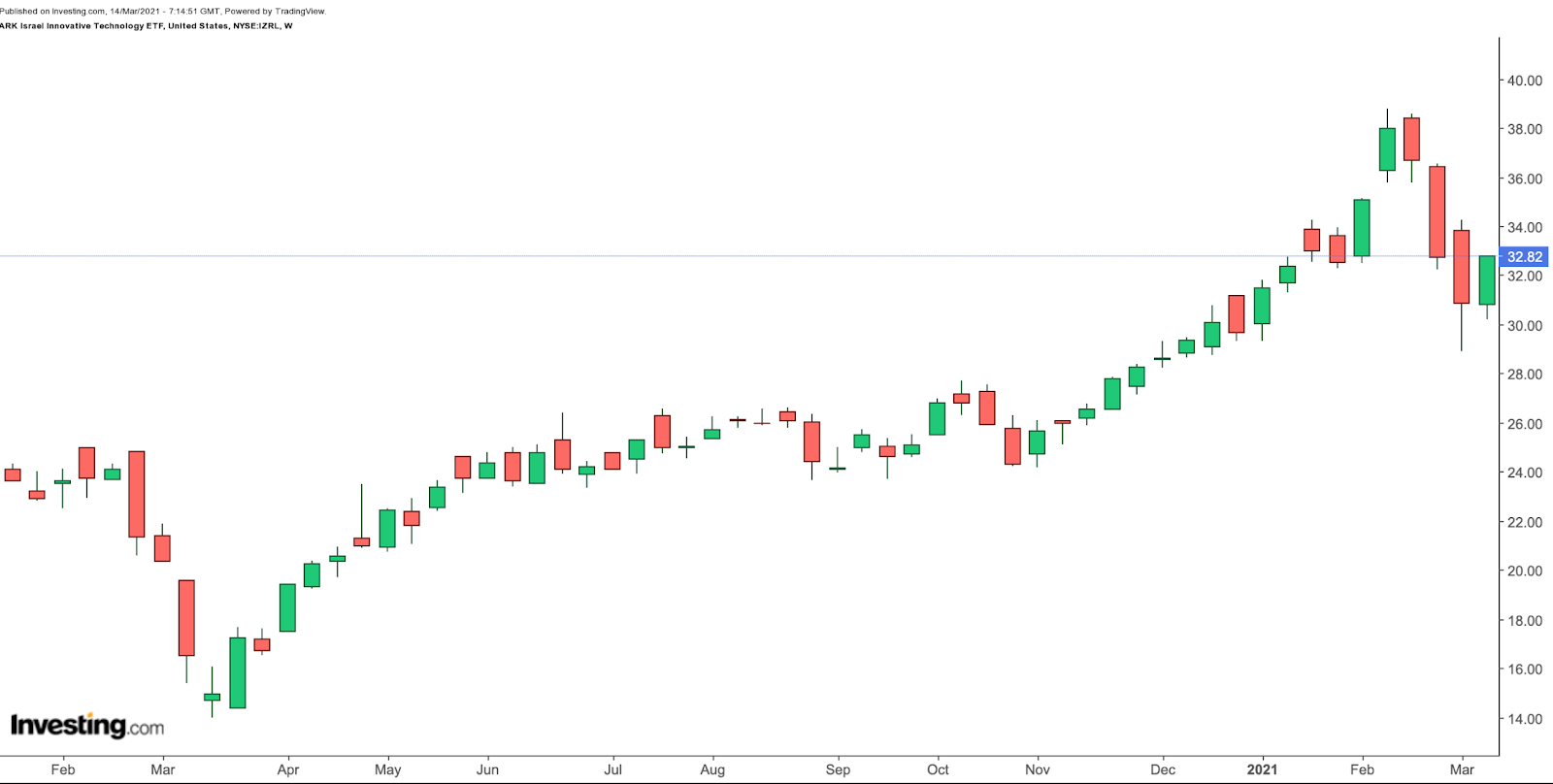The U.S. government has started sending out the third round of direct stimulus checks to eligible Americans. For those readers who have decided to invest some or all of the stimulus payment, buying an exchange-traded fund (ETF) for the long-term could be a viable option.
Let’s assume an individual is now 30 and plans to invest $1,400 across several funds. S/he has 35 years to invest. The annual return is 8%, compounded once a year, at the start of the compounding period. At the end of 35 years, the total amount saved is close to $20,700. And if the annual return were 10%, the final amount goes over $39,000.
With that information, today's article introduces two ETFs that could appeal to a wide range of market participants.
1. SPDR S&P Biotech ETF
- Current Price: $146.51
- 52-week range: $62.94 - $174.79
- Dividend Yield: 0.19%
- Expense Ratio: 0.35%
The SPDR® S&P Biotech ETF (NYSE:XBI) gives access to 170 biotechnology stocks. Since its inception in January 2006, net assets have grown to $7.4 billion.

XBI tracks the S&P Biotechnology Select Industry, which is equal-weighted. We recently discussed how equal-weight ETFs might help diversify long-term portfolios. Around 15% of the fund is in the top ten companies, whose market capitalizations (caps) range from $650 million to $33.3 billion.
Recent statistics highlight:
“Biotech companies have revolutionized multiple sectors, most notably agriculture and medicine… The global biotechnology market value is expected to reach $727.1 billion by 2025. It takes an average of 12 years for an experimental drug to traverse from the laboratory setting to the patient.”
Put another way, it can be a long wait for investors to see significant gains as businesses work with regulatory authorities for approvals.
Clinical-stage immunology group Vir Biotechnology (NASDAQ:VIR), Ligand Pharmaceuticals (NASDAQ:LGND), which holds economic rights to a range of medicines, BioCryst Pharmaceuticals (NASDAQ:BCRX), which focuses on the treatment of rare diseases, clinical-stage vaccine company Novavax (NASDAQ:NVAX), and clinical-stage biopharma Agios Pharmaceuticals (NASDAQ:AGIO) top the names in the roster of the ETF.
In the past 12 months, XBI returned over 106% and hit an all-time high on Feb. 9. Since then, it has lost about 16%. Given the choppiness in broader markets, there could be further profit taking in the names that make up the fund.
The biotech space remains a high-growth area. However, it is also a volatile sector. In the case of an unsuccessful clinical trial or a regulatory hurdle, a biotech name could lose a substantial amount of value in a matter of days.
Therefore, exposure to a large range of biotech names via a diversified ETF could be appropriate for most retail portfolios. In the coming quarters, many of the companies in the fund are likely to grow significantly or even become takeover candidates. The record-low interest rate environment, coupled with advances we have seen in the biopharma space due to the pandemic, have put the industry in the limelight.
2. ARK Israel Innovative Technology ETF
- Current Price: $32.82
- 52-week range: $14.00 - $38.77
- Dividend Yield: 1.45%
- Expense Ratio: 0.49%
The ARK Israel Innovative Technology ETF (NYSE:IZRL) invests in exchange-listed companies incorporated and/or domiciled in Israel. The fund started trading in December 2017, and net assets stand at $76 million.
According to Deloitte:
"With over 6,000 active startups and an economy dominated by industrial high-tech and entrepreneurship, Israel certainly earned its nickname 'The Startup Nation'."
The Global Innovation Index (GII) puts Israel at number 13 among 131 nations. The country regularly has a high "innovation" ranking in other similar indices, such as the Bloomberg Index Of Innovative Countries or the World Economic Forum's Global Competitiveness Report.
IZRL, which has 43 stocks, tracks the ARK Israeli Innovation Index, an equal-weight index rebalanced quarterly. As far as sectors are concerned, information technology tops the list with 50.6%, followed by health care (23.2%) and communication services (11.3%).
About two-thirds of the fund is in small-cap businesses—which the fund defines as those with market-caps of $300 million to $2 billion. Close to 16% of the fund is also in mid-caps—those stocks with market-caps of $2 billion to $10 billion.
Among the leading names in the ETF are digital advertising platform Perion Network (TASE:PERI) (NASDAQ:PERI), Gilat (TASE:GILT) (NASDAQ:GILT), which specializes in satellite networking technology, medical device group Intercure (TASE:INCR), whose Canndoc unit produces medical-grade cannabis, E&M (TASE:EMCO) that specializes in cloud, information systems, and data-center technologies, and InMode (NASDAQ:INMD) which develops minimally-invasive surgical and medical treatment solutions, such as those used in cosmetic procedures.
Over the past year, IZRL is up about 107% and hit a record high in early February. However, since then, the fund has lost about 33% in value. Those long-term investors who believe the innovative and entrepreneurial nature of these businesses will continue to create shareholder value might consider buying the fund around these levels.
